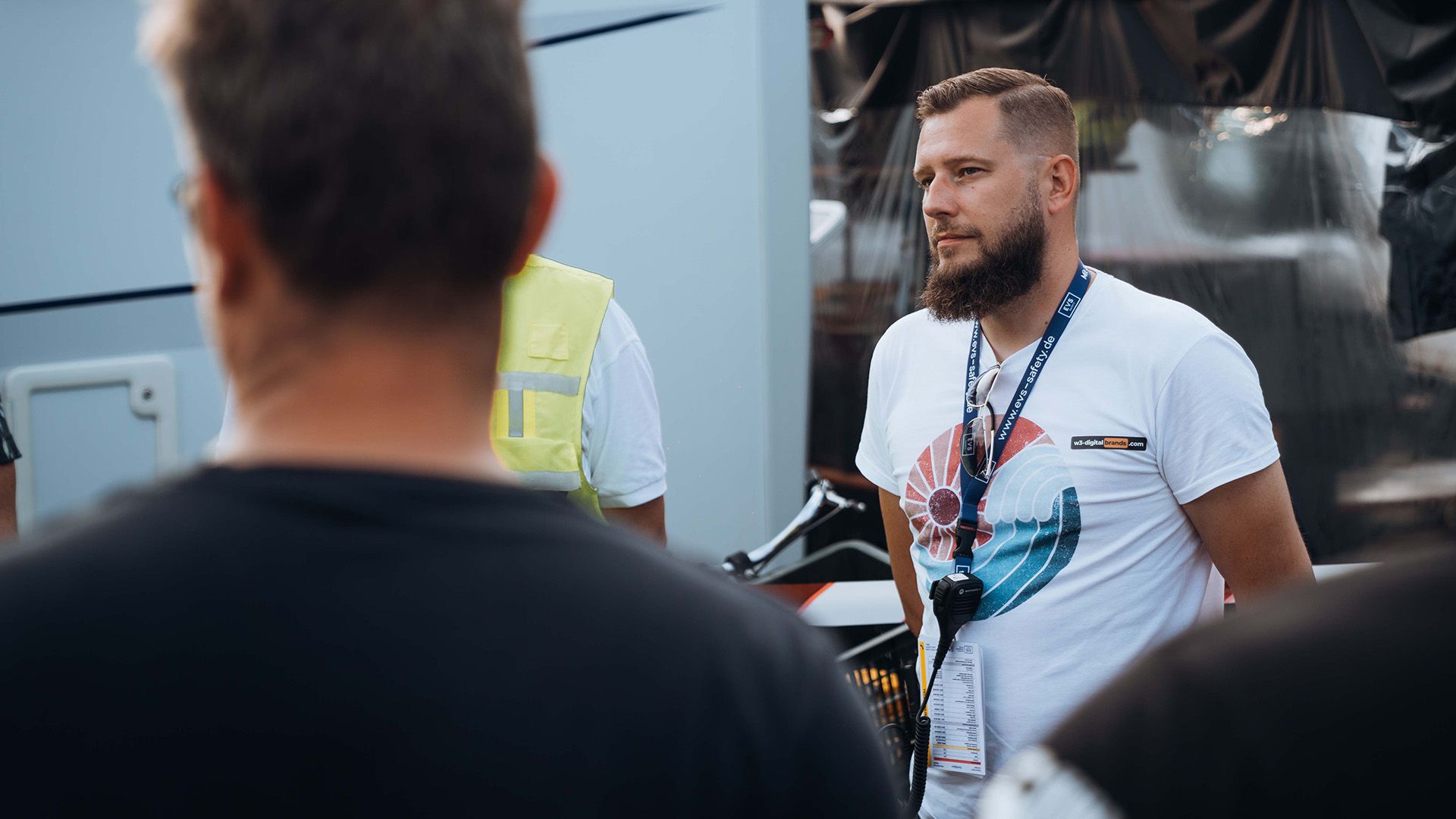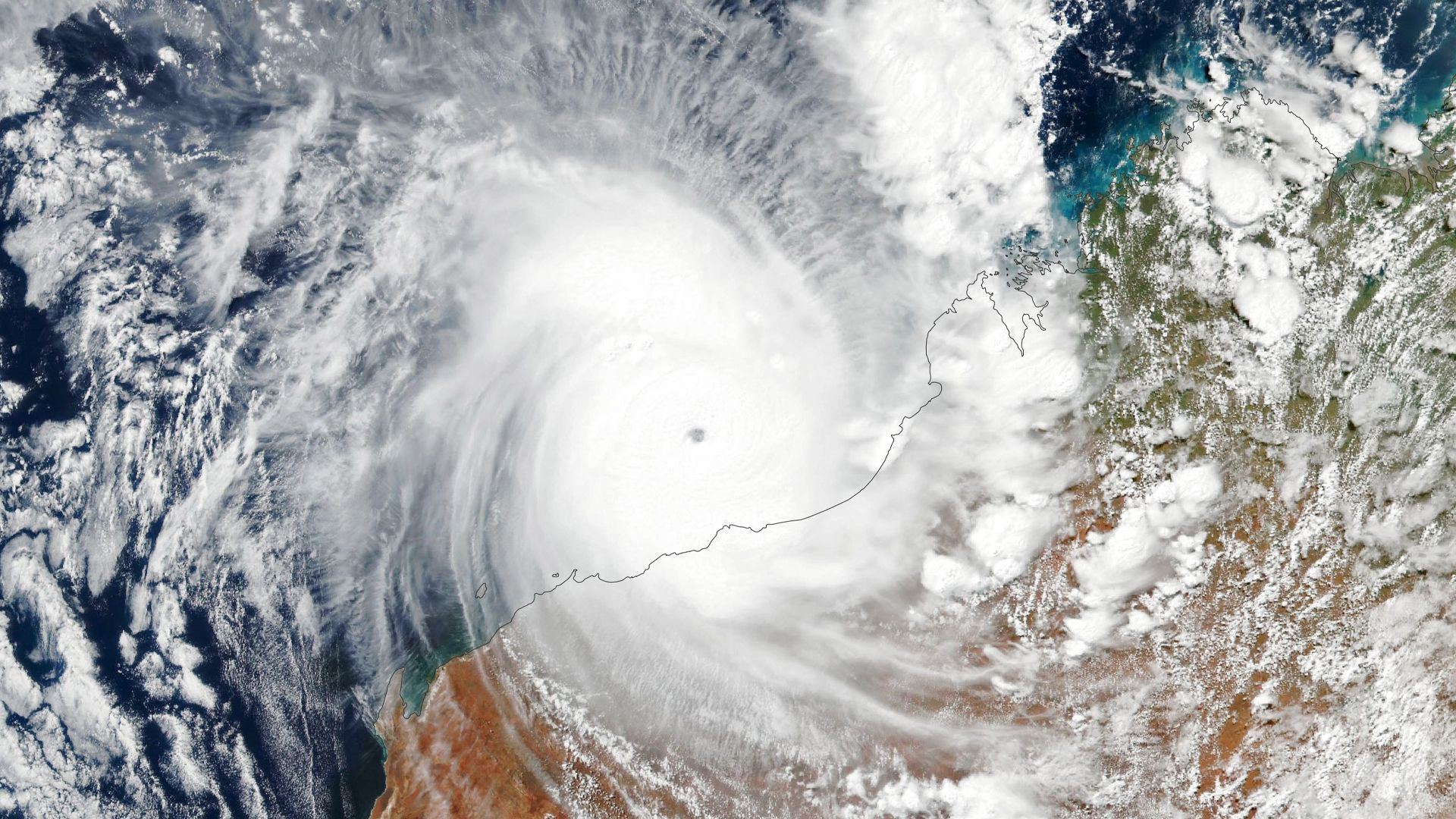
Interview with Dennis Eichenbrenner
Safety takes time
Dennis Eichenbrenner at the GuteZeit Festival - EVS Safety 2023. photo: Jonas Ressel
GuteZeit Festival - EVS Safety 2023 Photo: Jonas Ressel
Dennis Eichenbrenner is a specialist planner for event security and has been Chairman of the bvvs - Bundesverband Veranstaltungssicherheit since 2020. In this interview, he talks about the complexity of his field and his impressions of EURO 2024 and the Olympic Games in Paris.
tw conference business: What is event security?
Dennis Eichenbrenner: The term event safety covers a whole bunch of different topics. Fundamentally, the focus is on safety, i.e. the physical safety of visitors. However, it is of course also important to ensure a safe environment for employees, artists and other participants. Event safety experts have a comprehensive overview of the large number of issues that need to be considered and know how to deal with the numerous regulations and technical rules.
Is there a scheme that helps to take a structured approach to event security?
There is no one scheme with which a responsible person can deal with the complex world of event safety. A good start is made when a risk analysis is carried out after the event description and the hazards of the individual event are assessed. There are standard methods for this risk analysis, which are described in ISO 31000, for example. The next step is to develop the security concept. Templates can also be found in the literature that provide a certain structure. However, from a certain size of event or for more complex events, an expert should be brought on board.

"There is no one scheme that a manager can use to deal with the complex world of event safety."
Dennis Eichenbrenner, 1st Chairman of the bvvs - Federal Association for Event Security
What literature do you recommend?
I don't want to single out individual authors, but there are good collective works that are available:
- Method for risk analysis in civil protection, Federal Office of Civil Protection and Disaster Assistance
- Building blocks for the security of major events, Federal Office of Civil Protection and Disaster Assistance
- Recommendations on traffic and crowd management for events, Road and Transport Research Association
How do I find the right security expert for my event?
Unfortunately, expert doesn't always mean expert when it says expert. It is important that the consultant has appropriate references, i.e. has already been responsible for events of a similar nature. In general, references should define as precisely as possible what the consultant has contributed (event, task and year). A look at the list of members of the relevant associations, for example the Bundesverband Veranstaltungssicherheit, can also help, as they can also act as intermediaries.
About the bvvs
The Bundesverband Veranstaltungssicherheit e.V. (bvvs) represents the interests of all those who are responsible for the safety of visitors, participants and employees at an event. Its portfolio ranges from a service platform and representation of interests to the active development of safety procedures and safety materials. The association thus also serves as a platform for dialogue and the opportunity to actively help shape developments. The bvvs pursues the overarching goal of placing the topic of event safety in the consciousness of all organisers, participants and visitors.
What is important in the individual safety areas?
Every area has its own focus, so I can't give a generalised answer to this question. In general, it is important to understand that events are so diverse and different that it is rarely possible to make generalised or universally valid statements.
Let's take a closer look at visitor safety. How can visitor safety be addressed at events in public spaces such as the opening ceremony of the Olympic Games? What can planners of specialised events take away from this?
There are countless ways to ensure visitor safety at a huge event like the opening ceremony of the Olympic Games. In addition to the internal and external security situation, the entire process of the visitor, the so-called customer journey, must be taken into account at such events: Where does the visitor start? How do they get to the venue? How are the surroundings of the venue designed, the so-called last mile? How does the visitor get to the venue and what happens next? And then all the way back again.
How vulnerable do you think trade fairs and congresses are? What does this mean for event planners?
Trade fairs and congresses are no more vulnerable than other in-house events. Here, too, it is difficult to make a general statement. One safety-relevant point at trade fairs is often the set-up and dismantling phase, as a large construction site always creates certain danger zones. However, there is also a temporary infrastructure during operation, the safety of which must be permanently guaranteed. Depending on the theme of the trade fair or congress, risks can arise if various centres of conflict around the world are affected or exhibitors and speakers from these countries are taking part. This creates the need for special communication with those involved and the authorities as well as corresponding planning in the security concept.
In recent years, there has been a trend for business events such as the Digital X or the IAA Mobility to move out of the traditional event location and into the public space. What challenges does this pose for security concepts? How can they be solved?
The biggest additional challenge, along with several others, is certainly the general problem of "weather". On the one hand, planning and scenarios are needed for weather conditions that occur during operation, but there are also higher structural requirements than in an exhibition hall. These challenges can be overcome with professional and structured preparation and planning as well as appropriate rules for the construction of outdoor areas. A clear recommendation is to involve event safety experts early on in the planning process.
Have you been following EURO 2024 and the Olympics? What did you notice as a security expert?
As a sports fan and football enthusiast, I naturally followed both competitions and also advised them in the run-up to EURO 2024. First of all, I am very happy that both competitions were spared from attacks, which was a frequent topic in the media beforehand. What struck me was that both competitions were generally very safe and that event security was presented at a high level. Comprehensive planning was also undertaken at the EURO, which began many months in advance and was coordinated with the authorities at great expense.
As you say, there was increased reporting on security concepts and risks in the run-up to the major events. Federal Minister of the Interior Nancy Faeser visited the venues shortly before the start of EURO 2024 to convince herself of the security concepts. How do you rate the importance of proactive communication regarding security at the events?
There are always reports and articles about visitors shying away from large events and crowds. For this reason alone, it can only be a good thing if political and media attention is focussed on the topic. A major component of visitor safety is the guests themselves, which is another reason why it is good to have educated and informed guests at events. And last but not least, it shows the importance of our industry when these issues receive media coverage.
How do you feel about AI-driven crowd management systems? Have you already had experience with them? What have you noticed?
Personally, I wouldn't leave such an important function to an AI - and if I did, I would only give the AI the "right to make suggestions", which would be assessed and finally decided by an expert.
10th symposium for event security
On 15 and 16 October 2024, the 10th IBIT24 Conference on Event Safety will take place in Cologne. It is a platform for the exchange and transfer of knowledge and is dedicated to the discussion of relevant issues relating to event safety and the safety of people in large crowds. IBIT24 is aimed at a specialised audience.
What mistakes or negligence do you encounter at business events?
I've probably come across almost everything you can imagine. When it comes to security, smaller events in particular often rely on the location, and there are many top-class venues, but there are also others. Because business events can also be extremely diverse, it is difficult to make a general statement. In general, visitor safety suffers if nobody has an eye on it. It helps to give someone this responsibility and allow them the time to take care of it. It is even better to get good advice, present your own concepts to an expert and maintain a close dialogue.
What lessons should all event professionals take away from the 2024 summer of sport in Germany?
In Germany, we are in a position to organise mega events such as EURO 2024 at a top security level if they are well planned, coordinated and prepared.
New for our international readers:
For the first time, we are offering an English version of our magazine in addition to the German edition. The translation was made with the help of AI and is currently in the test phase. We’d love to hear your feedback on this new service!
